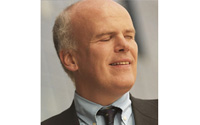

Mark Berrisford-Smith is head economist for HSBC, and his presentation focused on the state of the UK and global economies.
Mr Berrisford-Smith believes that the worst is over, and that things were definitely - albeit slowly - getting better. "Some days the financial news is positively boring," he noted. "Just as it should be."
He pointed out to delegates that it's been almost a year since anything "really awful" happened in economic terms, and that the country now needs to put distance between itself and the bad times. If, he said, we can see out the rest of this year without anything else bad happening, it'll be the first full year that will have been the case since 2005 that there hasn't been an economic crisis.
The continuing problems in the Eurozone mean that the UK will continue to find things tough, however, as Mr Berrisford-Smith noted, the country "can't fight its geography". Europe is going through an 18 month double dip recession, with no real sign of a positive change in the Eurozone until at least 2014.
For the UK economy itself, he firmly believes it's getting better, though he admitted that he "can't promise it'll stay better". The UK has avoided a triple dip recession, and he warned delegates against getting too bogged down in statistics. While the economy is still mostly flat, it is now moving up a gear, and he used the analogy of a car that was moving along at 5mph, now reaching 15mph. "It's still not as fast as you might like, but it's better than it was," he said.
While the economy as a whole is about 3% down on pre-recession levels, Mr Berrisford-Smith said some sectors have seen far worse falls. The financial sector is down 10%, oil and gas 40%, and the construction industry 20%. But while he believes the oil and gas sector will never fully recover, he is confident construction will improve again.
In a functioning economy, 7% of the UK's GDP comes from construction, and currently this sector contributes 6%, but "you will get it back", he said. "The only question is how long that will take."
Mr Berrisford-Smith said he believed it may be the early 2020s before construction is fully recovered.
"The biggest thing that's held this economy back is ordinary people," he said. "The rise in living standards we saw in the early 2000s has long gone, and people have changed the way they're addressing their finances. They're not in the mood to spend money."
In the last five years, inflation has consistently been ahead of earnings growth, and this has meant people are seven to eight per cent poorer in real terms than they were before. With over 60% of GDP coming directly or indirectly from consumer spending, this means the economy will continue to stagnate unless people feel confident enough to stop paying off debts, and to start investing again. Investment levels are also 8% down on pre-recession levels, he said.
Mr Berrisford-Smith believes that the UK economy will get back to where it was before the recession in 2015, but that it may take much, much longer for us to make up the growth we've lost in the years since, as the UK economy is "13% smaller than it should have been". To make back all the lost growth as well by the year 2027, he pointed out that UK GDP would have to grow by four per cent every year from 2016 to 2027.
That said, he was cautiously optimistic for the future, noting that we will get back to the trend rate of growth - between 2 and 2.5% - sooner than that, and that modest growth is still something businesses should be pleased with.